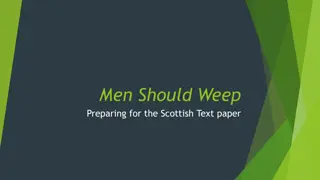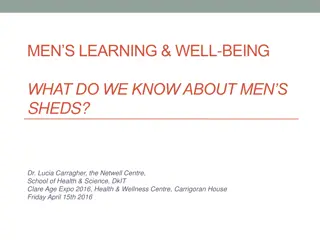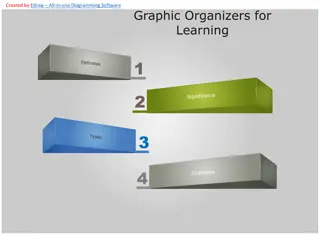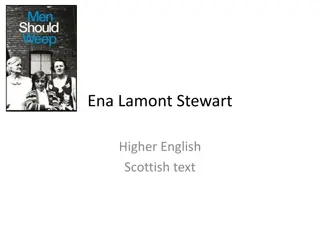Graphic Summary of "Men Should Weep" Play
"Men Should Weep" is a poignant play depicting the struggles of a working-class family in Glasgow. The story unfolds in a chaotic setting, revealing the family's hardships and strained relationships. The narrative delves into themes of poverty, domestic violence, and societal expectations, showcasing the characters' resilience amid challenging circumstances. As the plot progresses, tensions rise, culminating in emotional confrontations and revelations that impact the family dynamics deeply.
Download Presentation

Please find below an Image/Link to download the presentation.
The content on the website is provided AS IS for your information and personal use only. It may not be sold, licensed, or shared on other websites without obtaining consent from the author.If you encounter any issues during the download, it is possible that the publisher has removed the file from their server.
You are allowed to download the files provided on this website for personal or commercial use, subject to the condition that they are used lawfully. All files are the property of their respective owners.
The content on the website is provided AS IS for your information and personal use only. It may not be sold, licensed, or shared on other websites without obtaining consent from the author.
E N D
Presentation Transcript
Men Should Weep Revision
The Plot The Plot
Act 1 Scene 1 The play opens on a chaotic tenement setting, with Maggie calling for her children out of the window. A light-hearted domestic scene ensues with Granny complaining in the corner, the children running in from outside and Maggie soothing the baby and Bertie. Underlying the cheerful mood however, is the concerning deficiency of necessities. These are made more apparent by the arrival of Lily who reminds Maggie of her impoverished predicament. When John enters there is obvious affection between husband and wife, and an apparent tension between spinster Lily and chauvinist John. Offended by John, Lily leaves declaring she has lent Alec money. The neighbours enter with news of Alec s house collapsing and the scene closes with Mrs Harris annoyed at Maggie for accusing her daughter of having lice in her hair.
Act 1 Scene 2 The scene takes place towards midnight of the same day. Alec and Isa enter. The family are putting them up after the collapse of their tenement. Alec is drunk, and already the dynamic between him and his wife is clear. He fawns over her we see how he paws her - while she pushes him away. John s disapproval and disappointment in his son are revealed by his tone, Whit I d like tae dae is kick him oot o the house . Maggie placates and despairs. After Isa and John take Alec off, John returns, and there is a moment of affection between Maggie and John. They then eat a tin of beans together and Maggie has to admit that Jenny is not yet home. The mood darkens as John reacts angrily to this. He hears her outside and goes out, then drags her inside. Jenny is furious and says she is leaving; conflict ensues between father
Act 2 Scene 1 This scene takes place a week later. The neighbours are looking after Granny while she waits on Lizzie to pick her up. We sympathise with Granny here, who clearly wants to stay with Maggie. When Lizzie arrives, we realise she is a hard-hearted woman, who can only see Granny s pension. Jenny, Alec and Isa enter, followed soon after the removal men who have come to take Granny s bed. The first man chastises Isa for the way she speaks to Granny, forcing her to apologise, which is more than Alec can do. Maggie arrives upset with the news that Bertie has TB and must stay at the hospital. Several of the characters, led by Lily, sympathise, but the scene ends with Jenny s departure and an emotional speech from John in which he deliberates over his unjust predicament.
Act 2 Scene 2 It is now a month later and Isa and Alec are arguing because Isa says she will leave him for Peter Robb. We see the first display of Alec s violence when he gets hold of her by the throat out of anger and desperation. When Maggie enters, he playacts for sympathy and attention, and finally takes her money. John is critical of his son and comforts Isa. Maggie is upset that he does not stand up for his wife and walks out. Isa then flirts with John, which makes the audience question his strength of character. The scene ends with Maggie s breakdown into hysteria, which contributes to her decision at the end of the play.
Act 3 The final act begins on a positive note. The mood is upbeat like the beginning of the play, but the audience notices that the kitchen is tidy, there is a wireless playing jazz music, Ernest has new football boots and Maggie is in a new dress. This is all because John has found work. When he enters, he is happy and confident to be back in his role as provider and he movingly gives Maggie a red hat which reminds her of their courting days. Although Maggie's neighbours and later Lily are not impressed by the hat, Maggie insists on wearing it and she goes out window shopping on Sauchiehall Street.
Act 3 After a time lapse, Isa enters and starts to pack up her things. She makes it to the threshold with her suitcase only to find Alec standing there wild-eyed. Alec tries to strangle her for the second time, but again lets go. Isa pretends she loves him in order to leave and cunningly trips Alec up and races out the door, leaving him sobbing. After he has followed her out, Maggie and Lily re-enter and discover the mess the argument has created. Lily hides the knife in her handbag and Maggie, no longer happy, sits slumped in misery at the actions of her unruly son. Lily looks after Maggie and there is a poignant moment between the two sisters. The Act draws to a close with the arrival of Jenny, who has found a sugar daddy to keep her, and has pulled herself up from rock bottom. Jenny reveals the truth about Bertie and comes with a roll of notes that are to pave the way for Maggie s new life.
Act 3 John returns and there is immediate tension between father and daughter. He refuses the money and dismisses her attempt at helping the family, saying she hasn t earned the money. However, Maggie usurps his status of head of the house, takes the money and then humiliates John in front of Lily. The play ends with Maggie imagining her future, so it is therefore an optimistic conclusion.
Key scene - Maggie's breakdownAct II, Scene two This is a significant scene in Maggie s journey towards independence, as in it she realises she cannot tolerate the status quo. It begins with Isa and Alec arguing, which establishes the theme of conflict. When Maggie enters, her exhaustion is clear: she is dead beat and sinks into a chair. Having spent the day cleaning, she comes home to find the place like a midden and voices her frustration to John: ye could have tidied the place up afore ye went oot, but John declares he is a man and not a skivvy. Later John takes Isa s side and criticises Maggie for spoiling Alec. This hurts Maggie as she expects her husband tae stand up for his wife. Angrily she goes out: She seizes her coat and hauls it on, jams on her terrible old hat. The verbs seizes, hauls, jams convey the force of her actions and hence her strength of feeling. She is also shocked by Alec s theft of her money she can t help making a small sound. Maggie is let down by her husband and then her son and is realising where her selfless dedication to her family has led her. She looks at John coldly, portraying a new detachment from her husband. The tension between John and Maggie builds to a climax at the end of the scene. Maggie returns with chips for dinner but is still stoney-eyed. While she quietly moves to the kitchen and puts the kettle on, John turns his back on her, conveying the strain between them. Ernest is not used to his mother being like this. Hungry, he steals a chip without asking and his sister hits him. As he lifts his foot to kick Edie, Maggie sees the scuffed toe-caps of his boots and any self-control she had gives way. This is the final straw because it is yet another example of her efforts and money being used up for little gain. She screams and cries hysterically I hate ye! I hate the hale lot o ye! This is Maggie s nadir. She cannot take the relentless graft any longer. She exits, leaving John to calm the children, a job that she has done so often before. Interestingly John explains to them When women gets that tired they kind o loss their heids as if this is an attribute of the female sex. Maggie re-enters calmly, apologising for her hysteria. John pats her accordingly, and we wonder whether she may resume her stoic status, but the Maggie we see at the end of Act III proves that she does not forget her breaking point, nor the constant heartburn she suffers as mother to seven children living in severe poverty.
Key scene - Maggies decision Act III The end of Act III is of crucial importance in the play. It is in this scene that Maggie loses her stereotypical housewife status to become something much more significant. Jenny s arrival is the pivotal moment because Jenny provides them with hope for a better future so that Maggie s dreams that have been a long time forgotten can be realised. John declares in his prideful voice: If there is onythin tae be done, it ll be done by me, but he is then challenged by Lily who says she has had tae fight hauf [his] battles for [him] and then again by Maggie who speaks to him about the council house with a note of pleading in her voice. It is ironic that after John asserts his position of authority as heid o this hoose that he is passive for the rest of the scene as the women take over. After accusing Jenny of being a whore, John is humiliated. Firstly by Jenny who says she never had a chance at being with a decent fella because John was never able to provide her with a house she could bring such a man home to, and secondly, by Maggie. She significantly stops combing her hair which is a sign of her stress and indecisiveness and interposes herself between Jenny and John. These are deliberate actions, different to those of the earlier chaotic Maggie. She then speaks with uncharacteristic force, declaring that they wull be happy! She describes her coortin days , horrifying John with her whispered impression of John s lustful persuasion. She persists until John has sunk into a chair, covering his face with his hands, utterly shamed. Despite regretting her behaviour towards John, Maggie resolves to have a better life. While Jenny kneels before John, adopting her child-like status, calling him Daddy and asking to go back to the past when they both loved each other, Maggie takes charge. She says she can manage her husband and holding the roll of notes as if it were the key to her happiness, she describes her future where they live in a spacious house. The final line There ll be flowers come the spring! ends the play optimistically, as flowers represent the aesthetic world that
The Characters The Characters
Main Characters Main Characters
Granny Maggie Morrison John Morrison Lily Gibb Alec and Isa Morrison Jenny Morrison
Open your booklets at pages 11-14 Choose 5 quotes for each section and write them in the boxes (Pages 15-19 may help) LEARN THESE!!!!

 undefined
undefined

 undefined
undefined























